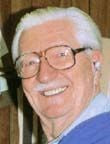Carl Barks
Carl Barks was born on March 27, 1901, on a grain ranch near Merrill, Oregon, a small town on the Oregon-California border, just south of Klamath Falls. The young Carl was a solitary youngster, partly due to the isolated location of his home and his partial deafness. Already at an early age, Barks began drawing. Further on, besides school, his youth was mainly filled with working for his parents. In December, 1918, Barks left home to try his luck elsewhere. After several heavy jobs varying from logger to working in a riveting gang, he finally got a job as cartoonist for a magazine called Calgary Eye-Opener. A few years later, in 1935, he heard of work at the Disney Studio and he decided to apply. Shortly after he was contracted, Barks submitted a gag about a mechanized barber chair for the Donald Duck cartoon Modern Inventions. This gag meant a promotion to the story department where Barks co-worked on famous cartoons like Donald's Nephews (1938), Donald's Cousin Gus (1939), Timber (1941), The Vanishing Private (1942) and The Plastics Inventor (1944). In the early 1940s, Barks was tired of working in collaboration. In addition, the Studio was rapidly being converted in a war plant which produced lots of films for the military. Getting sick of the air conditioning each day was the final straw and on November 6, 1942, he decided to leave the Studio to set up a chicken farm.
To earn a living, Barks wrote to Western Publishing saying that he was available to draw Disney comic-books. Although he hoped to develop his own set of characters to create his own independent comic-strip, he never got the chance to do so. Western hired him immediately to draw Donald Duck stories, and kept him at it for the next 25 years - and even into his retirement. In the cartoons Donald Duck was mainly a loafing, lazy hothead whose main funny quality was his hardly understandable quacking. To make him suitable for a comic-book story, Barks decided to give him a personality, an articulated speech and shaded emotions. To give Donald a world to live in, Barks developed the city Duckburg with citizens like rich uncle Scrooge McDuck, lucky nephew Gladstone Gander and the peculiar inventor Gyro Gearloose.
Although Barks has always said that his stories don't have a hidden meaning, a lot of his stories do feature a sharp vision to the daily pursuits of the human world. I always felt myself to be an unlucky person like Donald, who is a victim of so many circumstances. But there isn't a person in the United States who couldn't identify with him. He is everything, he is everybody; he makes the same mistakes that we all make. He is sometimes a villain, and he is often a real good guy and at all times he is just a blundering person like the average human being, and I think that is one of the reasons people like the duck. (Carl Barks, taken from 1975 and 1981 quotes)
On June 30, 1966, Barks retired and he left the world he created to new artists who picked up his style and approach. Still, this wasn't the end of his career. From 1972 up to today he has made about 150 paintings which mostly feature scenes from his stories and covers. In 1994 he made a tour through Europe and he co-worked on two new stories: Horsing Around with History (1994) and the yet-to-be-published Somewhere in Nowhere (1997). He's also been involved in the making of some collectibles, like the 70 drawings he made for his 96th birthday in 1997. Carl Barks passed away at about 12:15 AM PDT on Friday, August 25, 2000.



